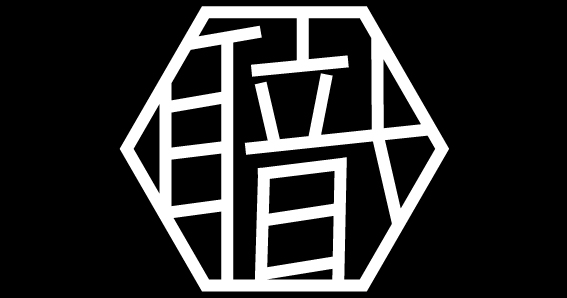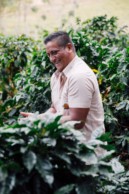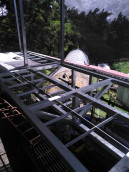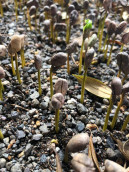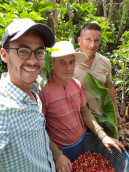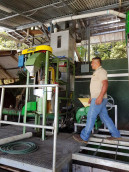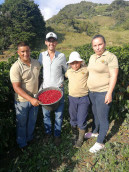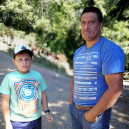
After hearing about a new style of promoting specialty coffee – a crowdfunding project named Planting Costa Rica – we met Nicolas Salcedo as a representative for this initiave. They wanted to reinvigorate the specialty coffee scene in Miramar, Costa Rica, and exported their first production with this kickstarter. The coffee turned out to be high quality and the producer shares Shokunin’s communal and sustainable, quality-oriented mindset, so it was a match.

After hearing about a new style of promoting specialty coffee – a crowdfunding project named Planting Costa Rica – we met Nicolas Salcedo as a representative for this initiave. They wanted to reinvigorate the specialty coffee scene in Miramar, Costa Rica, and exported their first production with this kickstarter. The coffee turned out to be high quality and the producer shares Shokunin’s communal and sustainable, quality-oriented mindset, so it was a match.
The value chain
The infographic below shows what the monetary value chain with this producer roughly looks like. This changes slightly per year based on volume and quality but is usually reliable over the years.

Key achievements
2017
October: started promoting El Bueyerito coffee in Europe to prepare for the kickstarter project.
December: launched kickstarter project to invest in a relatively unknown coffee origin.
2018
April: first shipment of kickstarter coffee.
November: pre-paid 30% of the new harvest so that Roberto has more financial security. This might increase the quality of the coffee a little.
2019
June: cupped second crop of this coffee. It scored 0.375 points higher than last year, based on the cuppings scores in origin and here in the roastery. This resulted in a direct quality premium to Roberto Jimenez of €0.1875 / kg.
December: pre-paid 30% of the new harvest so that Roberto has more financial security. This might increase the quality of the coffee a little.
2020
September: had a call to discuss future plans and projects. Possibly adopted an SL28 lot to become a Shokunin exclusive microlot.
December: pre-paid 30% of the new harvest again, making this a yearly commitment for more financial security.
The microlots
For now, we only offer don Roberto’s main coffee. However, new varieties have been planted and we are looking into these to diversify our offerings.
Nothing found.
Nothing found.
The story
Planting Costa Rica, who initiated the contact with El Bueyerito, is divided into three milestones, the kickstarter being the second. Their first phase included networking across Europe to introduce the project to potential buyers and raise awareness about the social impact specialty coffee has in producing countries. During this phase they also visited Costa Rican producers across the eight producing regions to introduce them to the specialty market in Europe. They also examined differences, strengths, and opportunities in the different regions. That is how they ended up in Miramar. After cupping coffee from different producers and regions and analyzing the situation in different places they decided to give a hand to El Bueyerito micro-mill.
They discovered the potential of this coffee that does not come from a popular region. Located in Puntarenas, the province that covers most of Costa Rica’s Pacific Coast, Miramar is part of the Guanacaste Region as stated by the Instituto Costariccense del Café. The local cooperative just underwent a budgetary crisis, causing the local production to drop from 2,000 hectares to only 600; some producers are even selling their coffee at a price that doesn’t cover the costs. Through this first project, Planting Costa Rica wants to help the producers at El Cedral de Miramar to overcome this crisis and introduce them to the specialty market. Just a 50-minute ride from downtown will get you to the highlands of Miramar at 1,200 m.a.s.l., with a microclimate that makes quality coffee production a reality.
Here, the producers are used to handing over their coffee to the cooperatives and they lack the knowledge on how to do the complete processing in order to get a good cup of coffee. You’ve probably heard the saying “teach a man to fish, and you feed him for a lifetime.” That is basically what Planting Costa Rica wants to accomplish but with coffee producers. They are reaching out to those coffee producers with a high potential to produce a better coffee, but have not found the way around it yet.
Roberto Jiménez, the owner of the micro-mill El Bueyerito, has been doing this for the past six years with approximately 50 small producers. Jiménez explains that he has given everything he has to enhance the quality of their coffee to those interested, but they still need some help. Through the crowdfunding they will develop the infrastructure at El Bueyerito but will also improve the know-how with the help of one of the members of the team, Pablo Juarez. Working in coffee for over 10 years, he started his coffee journey at a cooperative. His background includes being a Cup of Excellence judge and leading Fairtrade workshops in Papua New Guinea to help producers enhance their producing and processing skills to better sell their coffee.
Planting Costa Rica doesn’t end by giving the producers the knowledge and infrastructure to process high quality coffee. They also want to help them sell their coffee by creating direct trade connections, so they will be in charge of the export/import process with their network in Europe.
By supporting the kickstarter, sponsors would not only get great coffee—they are also helping to shape the future of Miramar’s coffee producing history. El Cedral has been producing coffee over the past 40 years but due to the poor administration of different cooperatives (and a wide variety of extenuating cultural and economic circumstances), producers have lost faith in coffee and have left it behind, introducing new crops to their farms. The region has gone from from producing 20,000 quintales of coffee to just 5,000 a year, and the numbers keep going down, but Jiménez and Planting Costa Rica have faith that the quality of the coffee can surprise the international coffee market. Motivation and a shift in mentality is key.
